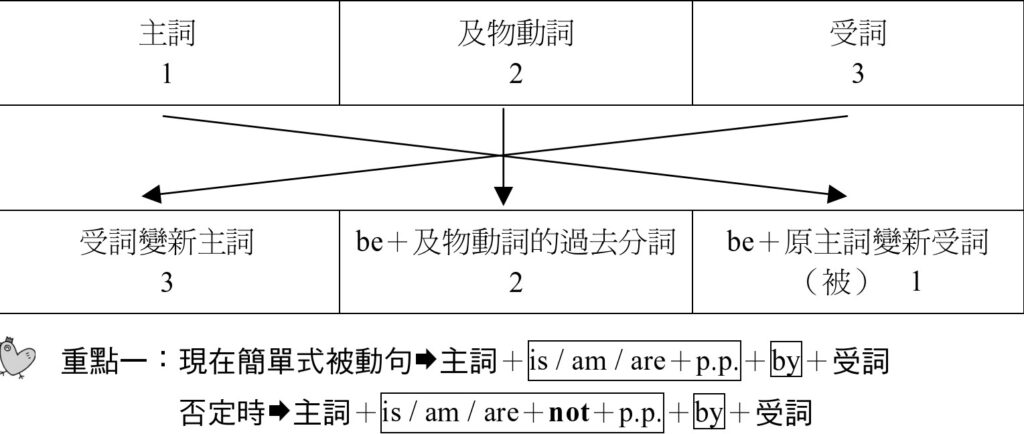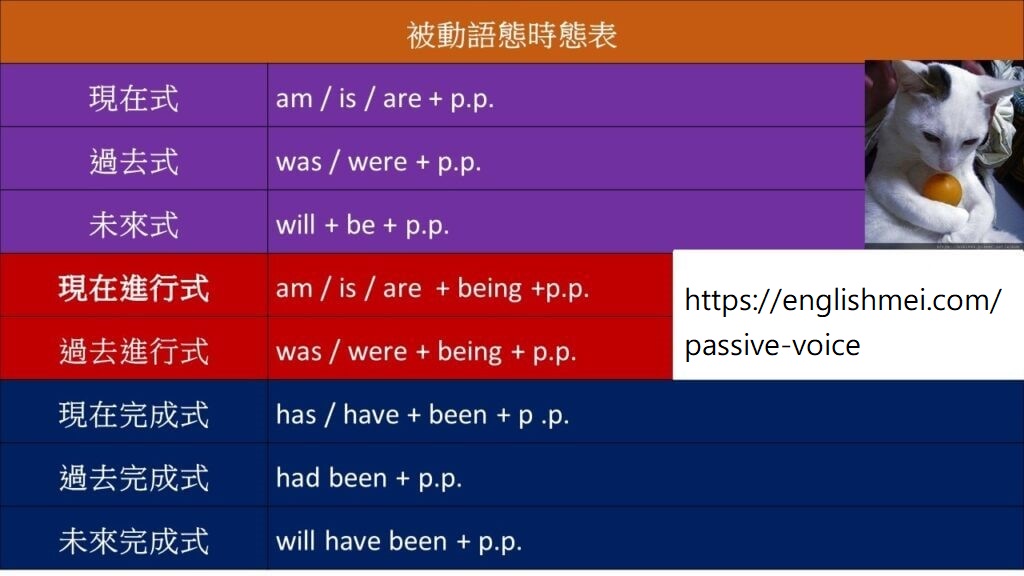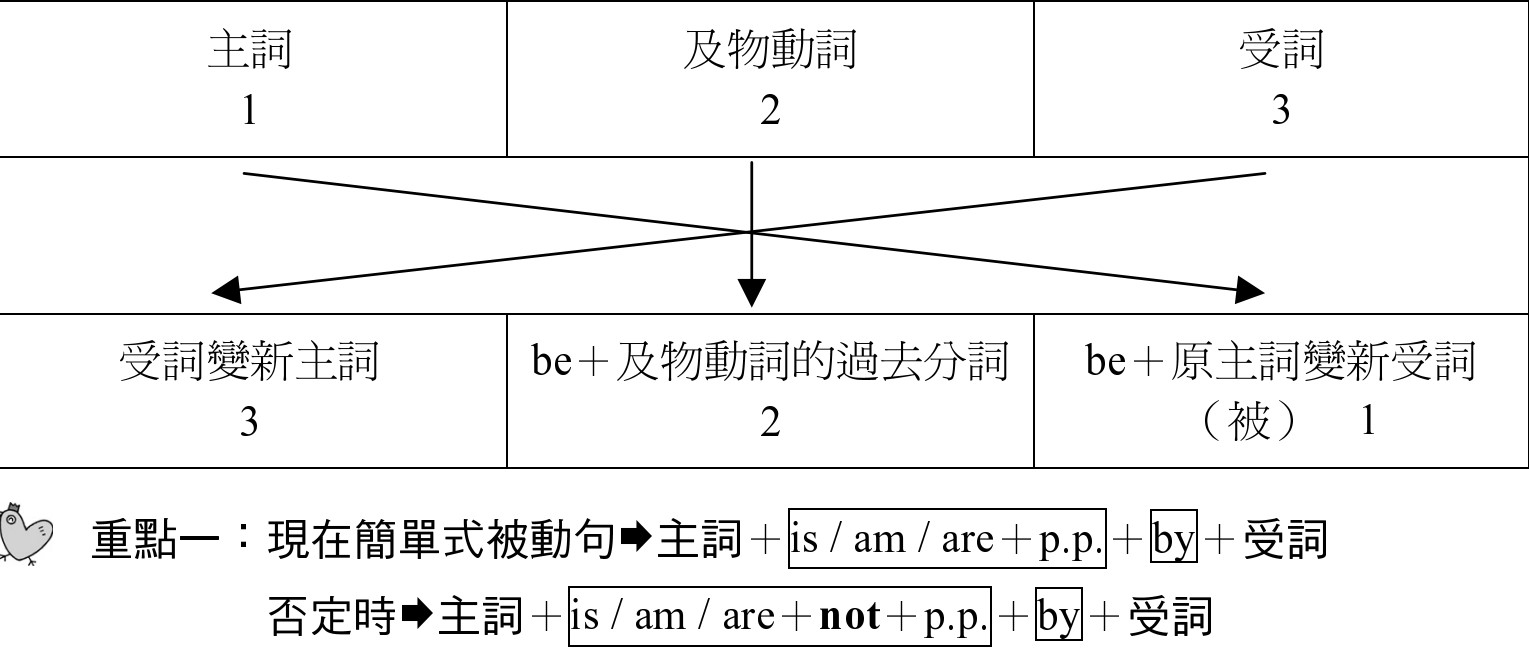英文被動語態文法定義
當該主詞無法做出該行為時,使用被動,例如衣服無法做出洗的動作、蘋果無法做出吃的動作,必須使用被動語態,衣服被洗,蘋果被吃。
被動語態文法句型
Be+p.p. Be→用來決定「時態」與「否定」→be+not , p.p(過去分詞)→表示該動作

現在式被動: am/is/are +p.p.
主動語態: Kelly eats the apple. (Kelly吃了那顆蘋果)
被動語態: The apple is eaten by Kelly. (那顆蘋果被Kyle吃)
否定被動語態 : The apple isn’t eaten by Kelly.

過去式被動: was/were +p.p.
The dog bit me. (狗咬我)
I was bitten by the dog. (我被狗咬)
現在進行式被動
be+v-ing
+ be + p.p.
be +being +p.p.
主動: Tom is washing the car.
被動: The car is being washed by Tom. (車子正在被Tom 洗)
過去進行式被動
was+were +being +p.p.
The floor was being cleaned by Tom at ten yesterday. (昨天10點時地板正被Tom清理)
現在完成式被動
have/has+p.p.
+ be+p.p.
have/has +been +p.p.
His homework has been done. (他的功課已經做好了)
The groundbreaking scientific discoveries _____ meticulously and validated by the academic community, paving the way for revolutionary advancements.
(A) being scrutinized (B) have been scrutinized (C) have scrutinized (D) scrutinized
| 【解析】「這些突破性的科學發現已被學術界仔細檢驗並驗證,為革命性的進步鋪平了道路。」 主詞是 “The groundbreaking scientific discoveries” (突破性的科學發現)。 後面的動作 “meticulously and validated by the academic community” 表明「被檢驗並驗證」,需要使用被動語態。 時態上,由於動作已經完成並影響到現在,因此需要現在完成式的被動語態。 (A) being scrutinized:正在被檢驗。這是現在進行式的被動語態,但不符合已完成的語境。 (B) have been scrutinized:已經被檢驗。這是現在完成式的被動語態,與句意和時態一致。 (C) have scrutinized:已經檢驗(主語是發現)。這是主動語態,不符合句子需要的被動語態。 (D) scrutinized:過去式或過去分詞。若單用「scrutinized」缺乏輔助動詞,無法形成完整的句子。 113 桃園市國民中學新進教師甄選試題:英語文科 第16題 |
過去完成式被動: had been p.p.
The desk had been fixed when I arrived. (我到達時,桌子已經被修理好了)
未來式被動語態: will be p.p.
The car will be bought by Tom tomorrow. (明天車子將會被Tom買走)
情狀助動詞被動語態
shall→should can→could will→would must
全部加上be+p.p. 助動詞後使用原型動詞,因此be動詞需使用原型
The car should be fixed.(車子應該要被修理)
The cat can be found. (貓咪可以被找到)
The traffic rule must be followed. (交通規則被須被遵守)
被動省略by+人
若該動作的行為人為大眾所不知,或不需要被提及之人如we.they.someone.people,則省略by+人
People built Taipei 101 in 2004.
→ Taipei 101 was built in 2004.
被動語態疑問句
Does Tom open the door?
→ Is the door opened by Tom? do/does/did 刪除 其餘依照直述句改法,最後將be動詞往前移改大寫
Can I eat the hot dog?
→ Can the hot dog be eaten by me? 有意義之助動詞需留下
疑問詞改被動
What should we do?
→ What should be done by us?
Who can mop the floor?
→By whom can the floor be mopped?
祈使句的被動語態
肯定句主動: RV+….
肯定句被動: Let +受詞 + be +p.p.
否定句主動:Don’t VR +…
否定句被動: Don’t let +受詞+ be +p.p.
= Let +受詞+ not +be +p.p.
立刻把垃圾拿出去丟
Take the grabage out at once.→Let the grabage be taken out at once.
別碰那個花瓶
Don’t touch the vase.→ Don’t let the vase be touched. = Let the vase not be touched.
沒有被動語態的動詞
不及物動詞或瞬間動詞無被動語態
appear, die disappear, end (vi. 束), fail, happen, last, lie, remain, sit, spread, stand ,break out, come true, fall asleep, keep silence, lose heart, take place.
不能用於被動語態的及物動詞或瞬間動詞
fit, have, hold, marry, own, wish, cost, notice, watch agree with, arrive at / in, shake hands with, succeed in, suffer from, happen to, take part in, walk into, belong to
連綴動詞無被動語態
appear, be become, fall, feel, get, grow, keep, look, remain, seem, smell, sound, stay, taste, turn
會考被動語態歷屆試題
( A ) 1. The housework in Mr. and Mrs. Wang’s family ____ between them and their kids. Everyone’s got their own job to do. 【113-19】
(A) is shared (B) are shared (C) shares (D) share
( C ) 2. Doraemon, a blue Japanese robot cat, has hated mice since his ears by a mouse. (A) bit (B) bite (C) were bitten (D) have bitten 【112-13】
( D ) 3. The police haven’t found the little girl who ____ at a supermarket. They’ll keep doing all they can to find her. 【111-17】
(A) took away (B) taken away (C) has taken away (D) was taken away
( D ) 4. The cellphones that ____in that country are good but expensive.【110-補-9】 (A) make (B) are making (C) have made (D) are made
( D ) 1. Alison doesn’t like ____what to do. She only does things she wants to do. 【109-11】(A) told (B) to tell (C) be told (D) to be told
( C ) 2. Many famous people visit this restaurant. Popular singers like A-mei and Jay Chou _____ here with their friends. 【107-11】
(A) to be often seen (B) often seen (C) are often seen (D) and are often seen
( A ) 3. The little girl was _____by a truck on her way home and was badly hurt. 【106-4】 (A) hit (B) led (C) lost (D) paid
( D ) 4. My dog Jimmy loves _____ with a comb(梳子). Every time I comb(梳)his hair, he will close his eyes and fall asleep(睡著的). 【105-15】 (A) to brush (B) brushing (C) to be brushing (D) being brushed
( C ) 5. A new road is going to ______ in town because traffic(交通)is getting busier and busier. 【96-1-15】(A) build(建造) (B) building (C) be built (D) have built
( B ) 6. Most of Jeff’s best books______ when he was sick and poor. 【95-2-13】 (A) have written (B) were written (C) would write (D) wrote
( B ) 7. Mike has a loud voice. His voice can _____ clearly even in that big classroom. 【92-1-9】 (A) hear (B) be heard (C) be hearing (D) have heard
( C ) 8. Susan: Oh, no! The door and the window ____! Victor: Who could have done this? Susan: Go in quickly and see if we’ve lost anything. 【91-1-6】 (A) are breaking (B) have broken (C) were broken (D) will break
教甄國考經濟特考考題
Job applicants _______ to video record answers to set questions about their experience, skills and personal qualities, rather than speaking with a recruiter by phone or video chat. (112花蓮國中小英文教甄)
(A) has been asked (B) will ask (C) are asking (D) are being asked Ans:D
If I ________ the choice of making either an oral or a written report, I ________ the second alternative.
(A) gave; could pick
(B) had been given; might pick
(C) would have given; had picked
(D) were given; would pick (111新竹建功高中國中部英文教師甄試第11題)
Ans:D (被給予做口說報告或書面報告的機會,與現在事實相反)
A gifted tangerine tree _____, according to Chinese feng-shui experts, because in doing so, the receiver is essentially turning away luck and fortune.
(A) should be refused (B) should never be refused
(C) should have refused (D) should have been refused
Ans: B (不應該被拒絕) 114台南國小教甄
- 英文字母大寫規則 Capitalization
- 英文人稱代名詞、名詞單複數
- am is are was were 與do does did done
- 主詞 所有格 受格 所有格代名詞 反身代名詞表
- N of N所有格 非生命所有格
- 指示代名詞this that these those 文法
- 時間介係詞 on in at
- 時間介係詞 in at on 介係詞總整理
- talk speak say tell 都是說差別在哪裡?
- 附加問句文法
- 附和句文法
- 交通工具搭乘文法
- Here倒裝句文法
- Have 用法總整理1
- Have 用法總整理2
- take用法總整理
- 英文被動語態文法
- 沒有被動語態的動詞
- 被動語態(感官&使役&授與動詞)
- 後位修飾法 形容詞片語修飾名詞
- 情緒形容詞(過去分詞)文法
- too…to/enough to/So … that…/such that 文法
- Yes or No 疑問句改間接問句
- 間接問句文法講義 練習題
- As long as /as soon as 文法
- 雙字片語可分式片語與不可分式片語總整理
- 英文字尾er or ist 職業英文單字
- late latter later latest last 文法
- die death dead 用法與片語
- someday/one day /the order day/some other day 用法
- Thank 人 for 事為某事感謝某人 感嘆句文法
- A marry B A和B結婚英文怎麼說
- 英文時間地點哪個先寫
- have a big sale/on sale/for sale 意思
- on time/in time/at the end of/in the end差異
- fill與stuff 使用差異
- 幾分之幾英文怎麼說
- Help文法句型 幫助某人片語

